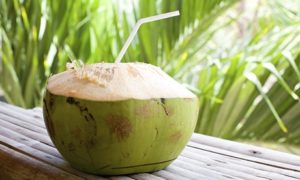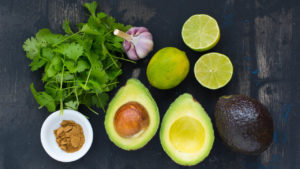
My childhood memories are filled with Jamaican Jerk Pork fresh from the barbecue pit on the beach, fried sweet plantains in the mornings, “mannish water” (a hot pepper soup served at weddings and gatherings), fresh coconuts from the roadside stall – chopped open right there so we can drink the cool refreshing water and then opened again so we can eat the delicious coconut jelly. I hope that I am not alone in saying that food is a major focus in my memories. Not just the visual appeal, beyond just the mouth-watering aroma, more than the incredible taste and texture, but the evocative memories of past times that have fed my soul. These foods were shared in community and family, and the memories are inextricably linked to nourishment of body and of soul.
A few years ago, a friend invited me over to eat her home-made Jamaican food. Of course, I said, “Yes!” I had grown up with these foods, and longed to eat them again. Truthfully, when good food is involved, I’m always in! (Call me.) But Jamaican food is an extra special treat infused with childhood memories of family gatherings, of my grandmother, of family vacations, of a place that once was home.
My friend and I began to eat. After a long pause, I realized that I was the only one eating. She was just sitting there watching me.
“I love to watch you eat,” she said finally.
“Why?” I asked distractedly, continuing to eat. She didn’t say anything and just continued to stare at me.
And then, I heard it for the first time. As I ate, these strange sounds escaped me, “Mmmmmm…”, “Ahhhhh…”, “Oooooo…”
Was I always this vocal when I ate? I wondered to myself.
I suppressed them for a moment, and then realized that the urge was too strong! And so I just sat back and enjoyed the eating (and all the sounds that came with it). I was completely in the moment. In fact, I added even more gusto! Mmmmmm. I enjoy just thinking about it.
Every culture has its own foods. Even the most sacred of ceremonies often involve food – celebrating weddings, births, holidays. The foods we eat and how they are prepared are transmitted from one generation to the next.
As the world becomes more interconnected, eating habits and nutrition recommendations continue to change at a rapid pace. When I began to change from a meat-centric diet, I could not rely on the traditional transmission of food culture. My family and parents could teach me how to cook in their tradition and with their food ingredients, but I also wanted to explore other ways to learn about expanding into more whole-food, plant-based options in my diet. The next question was “How?” Recipes are helpful, but often not enough. Education on new foods, how to buy them, as well as new cooking techniques, become very important.
These days, the internet is a great source of recipes, food information, and cooking techniques. My parents did not grow up with a Vitamix. I had to learn how to use it. While internet websites can be informational, sometimes the credibility of the source is difficult to assess. Advertising and financial incentives have found a new market on the internet and muddle the information. Health and nutrition coaches also offer classes and one-on-one consultations. Free videos online are a great source of “how-to” information, but again the information is sometimes inaccurate. Health and cooking experts have published books. Cooking channels and shows have become popular. There is an overabundance of information.
A few months ago, I was having a conversation with Ken Rubin, a chef educator and food anthropologist. He is Vice President of Culinary Training for Rouxbe Online Cooking School. We had a remarkable conversation about his anthropology research as a student. He described the ritual and ceremony of food culture, and how food culture is passed on from one generation to the next. As nutrition recommendations have changed and food culture has become more global, there is now a disruption in how food culture is passed on.
 The Rouxbe online cooking school has an amazing platform for professional cooking certification at an economical price (compared to traditional cooking school). I suddenly realized that this is a new method of transmission of food culture. The Rouxbe cooking school has teamed up with multiple partners, including local supermarkets, to utilize the online platform. The Plantrician Project, a group that promotes plant-based nutrition as a health initiate, has teamed up with the Rouxbe cooking school to create CulinaryRx. Anyone can sign up, but a physician referral gets you a discount (email me if you are interested). CulinaryRx is an instructional cooking and nutrition course that empowers students through their transition to a healthier, whole food, plant-based way of living with over 40 recipes and 25 videos. Along with other internet resources, this is just one of the ways to learn a new food culture.
The Rouxbe online cooking school has an amazing platform for professional cooking certification at an economical price (compared to traditional cooking school). I suddenly realized that this is a new method of transmission of food culture. The Rouxbe cooking school has teamed up with multiple partners, including local supermarkets, to utilize the online platform. The Plantrician Project, a group that promotes plant-based nutrition as a health initiate, has teamed up with the Rouxbe cooking school to create CulinaryRx. Anyone can sign up, but a physician referral gets you a discount (email me if you are interested). CulinaryRx is an instructional cooking and nutrition course that empowers students through their transition to a healthier, whole food, plant-based way of living with over 40 recipes and 25 videos. Along with other internet resources, this is just one of the ways to learn a new food culture.
Food culture is just a subset of the “information” that is now transmitted by the internet. However, remember that food is not just information, food is how we socialize. Healthy can be enjoyable. Explore new options. Create new memories with family and friends. Keep it sacred, be present as you eat, and remember “Mmmmm”, “Ahhhh”, “Oooooo” … trust me! Enjoy your food with gusto. It will enhance your enjoyment of life.